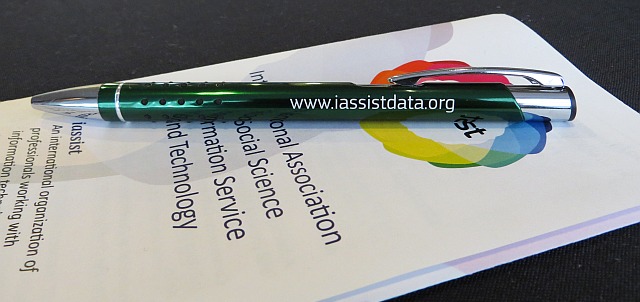By t.alatera | July 3, 2015
Open Repositories conference celebrated its first decade by having four full days of exciting workshops, keynotes, sessions, 24/7 talks, and development track and repository interest group sessions in Indianapolis, USA. All the fun took place in the second week of June. The OR2015 conference was themed “Looking Back/Moving Forward: Open Repositories at the Crossroads” and it brought over 400 repository developers and managers, librarians and library IT professionals, service providers and other experts to hot and humid Indy.
Like with IDCC earlier this year, IASSIST was officially a supporter of OR2015. In my opinion, it was a worthy investment given the topics covered, depth and quality of presentations, and attendee profile. Plus I got to do what I love - talk about IASSIST and invite people to attend or present in our own conference.
While there may not be extremely striking overlap with IASSIST and OR conferences, I think there are sound reasons to keep building linkages between these two. Iassisters could certainly provide beneficial insight on various RDM questions and also for instance on researchers’ needs, scholarly communication, reusing repository content, research data resources and access, or data archiving and preservation challenges. We could take advantage of the passion and dedication the repository community shows in making repositories and their building blocks perfect. It’s quite clear that there is a lot more to be achieved when repository developers and users meet and address problems and opportunities with creativity and commitment.

While IASSIST2015 had a plenary speaker from Facebook, OR had keynote speakers from Mozilla Science Lab and Google Scholar. Mozilla’s Kaitlin Thaney skyped a very interesting opening keynote (that is what you resort to when thunderstorms prevent your keynote speaker from arriving!) on how to leverage the power of the web for research. Distributed and collaborative approach to research, public sharing and transparency, new models of discovery and freedom to innovate and prototype, and peer-to-peer professional development were among the powers of web-enabled open science.
Anurag Acharya from Google gave a stimulating talk on pitfalls and best practices on indexing repositories. His points were primarily aimed at repository managers fine-tuning their repository platforms to be as easily harvestable as possible. However, many of his remarks are worth taking into account when building data portals or data rich web services. On the other, hand it can be asked if it is our job (as repository or data managers) to make things easy for Google Scholar, or do we have other obligations that put our needs and our users first. Often these two are not conflicting though. What is more notable from my point of view was Acharya’s statement that Google Scholar does not index other research outputs (data, appendixes, abstracts, code…) than articles from the repositories. But should it not? His answer was that it would be lovely, but it cannot be done efficiently because these resources are not comprehensive enough, and it would not possible for example to properly and accurately link users to actual datasets from the index. I’d like to think this is something for IASSIST community to contemplate.
Open Researcher and Contributor ID (ORCID) had a very strong presence in OR2015. ORCID provides an open persistent identifier that distinguishes a researcher from every other researcher, and through their API interfaces that ID can be connected to organisational and inter-organisational research information systems, helping to associate researchers and their research activities. In addition to a workshop on ORCID APIs there were many presentations about ORCID integrations. It seems that ORCID is getting close to reaching a critical mass of users and members, allowing it to take big leaps in developing its services. However, it still remains to be seen how widely it will be adopted. For research data archiving purposes having a persistent identifier provides obvious advantages as researchers are known to move from one organisation to another, work cross-nationally, and collaborate across disciplines.
Many presentations at least partly addressed familiar but ever challenging research data service questions on deposits, providing data services for the researcher community and overcoming ethical, legal or institutional barriers, or providing and managing a trustworthy digital service with somewhat limited resources. Check for example Andrew Gordon’s terrific presentation on Databrary, a research-centered repository for video data. Metadata harmonisation, ontologies, putting emphasis on high quality metadata and ensuring repurposing of metadata were among the common topics as well, alongside a focus on complying with standards - both metadata and technical.
I see there would be a good opportunity and considerable common ground for shared learning here, for example DDI and other metadata experts to work with repository developers and IASSIST’s data librarians and archivists to provide training and take part in projects which concentrate on repository development in libraries or archives.
Keynotes and a number of other sessions were live streamed and recorded for later viewing. Videos of keynotes and some other talks and most presentation slides are available already, rest of the videos will be available in the coming weeks.

